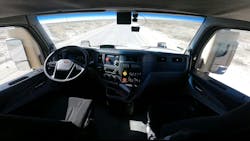NHTSA proposes exemptions tailored for autonomous vehicles
The federal government made a major stride in embracing driverless fleets. The National Highway Traffic Safety Administration proposed a new program to monitor automated vehicles.
The program is called the Automated Driving System-equipped Vehicle Safety, Transparency, and Evaluation Program, or AV STEP. As proposed in the 265-page NPRM, it would be a voluntary oversight program to support future regulation of AVs.
The program would introduce a dedicated exemption process for AV deployment across all vehicle classes and most operations, including fleets’ commercial operations.
NHTSA first teased the program in 2023 and issued a notice of proposed rulemaking for the AV program in the Federal Register earlier this month.
See also: Fleets Explained: Autonomous vehicles
What would the program do?
As autonomous vehicles continue to develop, NHTSA expects it will need new exemptions and minimum safety standards for this budding form of locomotion. The agency is proposing AV STEP to help develop those exemptions and standards.
AV exemptions today
Manufacturers can already deploy AVs on public roads under the National Traffic and Motor Vehicle Safety Act so long as they comply with existing laws.
Because NHTSA’s safety standards don’t have standards specific to autonomous systems, many compliant vehicles can have ADS technology added to them and operate on public U.S. roads. The 2015 transportation funding bill also allowed manufacturers to test noncompliant vehicles on public roads so long as they do not sell the vehicles, which still supports modern ADS testing.
ADS developers also have two existing exemptions under 49 U.S.C. 30114 and 49 U.S.C. 30122: an exemption for show or display of vehicles and an exemption for activities like research and training. From 2020 through 2023, NHTSA said it approved applications for 222 imported ADS-equipped vehicles under the latter exemption.
The agency wants to introduce new exemptions for these regulations to be tailored to large quantities of more mature AVs. Where previous exemptions may cover one vehicle for a single route, an exemption under AV STEP could bring quicker approvals for a larger number of vehicles and routes.
The program would provide perks to participating manufacturers, ADS developers, and fleets looking to operate on public roadways. Participants would enjoy a dedicated exemption process for AVs and a platform to demonstrate their safety. NHTSA and the public would enjoy greater oversight and transparency.
As proposed, vehicles of any class or operation could participate in the program. Participating groups would submit regular reports to NHTSA, focusing on safety decision-making. NHTSA would publish the information publicly. The exact reporting requirements can be tailored to each specific ADS to account for the diversity of available systems.
The participants could then receive exemptions for vehicle safety standards on public roads. The rule proposes special exemptions for 49 U.S.C. 30114(a), which prohibits companies from manufacturing/selling/importing noncompliant equipment, and 49 U.S.C. 30122(c), which prohibits companies from disabling vehicles’ safety features.
Participating in AV STEP
Groups interested in participating in AV STEP would supply an application to NHTSA with information on vehicle design, development, and planned operations and deployment. The agency would review that information and then establish the terms for program participation.
The application would need to include structured arguments and evidence to show that the system is safe enough for its purpose. NHTSA would ask a third-party expert to review the application to help the agency’s approval process.
To be eligible, the ADS must be developed to work without the expectation of a human driver and be able to perform all driving tasks for its intended operation. Under SAE’s autonomy levels, NHTSA’s eligible systems would be SAE Levels 3, 4, and 5.
The program would have two separate workflows to support AVs with a fallback human operator and those with no fallback. An ADS that requires no fallback would be considered an SAE Level 5 system, which does not yet exist.
If an application is approved, NHTSA’s final approval terms would decide the approved vehicles, locations, times, operations, and stakeholders for participation. The agency noted that an approved application could include commercial operations—with safeguards.
The safeguards would require AV STEP participants to disclose any commercial operations and demonstrate that the operation furthers public interests. NHTSA’s examples of public interests include environmental gains or improving transportation efficiency—two areas where autonomous trucks excel. The proposed rule also notes that it could harmonize the program with future U.S. Department of Transportation rules, such as FMCSA’s stalled plans for autonomous commercial vehicles.
See also: How federal agencies will regulate trucking this year
What happens next
NHTSA is accepting public comments on the NPRM until March 17. The agency provides instructions for submitting comments here.
The time between a proposed rule and final rule can be anywhere from months to years. Administrative turnover following the presidential inauguration will slow down NHTSA’s operations, and Trump’s regulatory freeze will likely further stall rulemakings for months.
If this program reaches the final rule stage, it could likely look notably different than the current NPRM. The AV STEP proposed rule was developed under the Biden administration; the new Trump administration may have different priorities for the program.
As three legal experts wrote in Holland & Knight’s transportation blog, it’s unclear whether Trump’s administration will modify the rule before it is finalized or withdraw the rule and start from scratch. However, the Trump administration showed a clear enthusiasm for embracing budding technologies broadly and autonomous vehicles specifically, so federal processes tailored to AVs are likely.
About the Author
Jeremy Wolfe
Editor
Editor Jeremy Wolfe joined the FleetOwner team in February 2024. He graduated from the University of Wisconsin-Stevens Point with majors in English and Philosophy. He previously served as Editor for Endeavor Business Media's Water Group publications.

